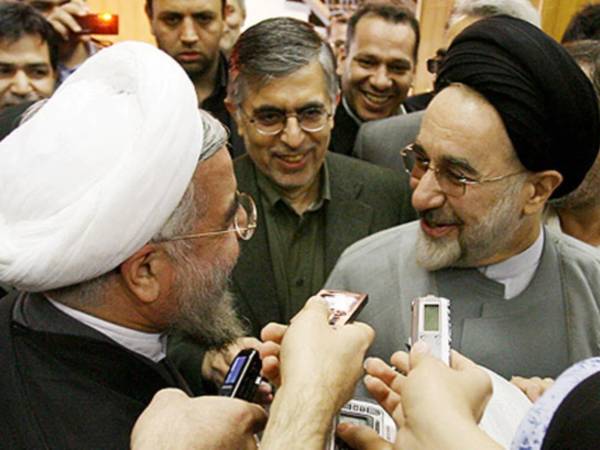Two of Iran's former presidents, Hassan Rouhani and Mohammad Khatami have highlighted Iran's missed foreign policy opportunities, blaming hardliner conservatives.
Referring to Iran's rapprochement with Saudi Arabia, Rouhani said during a recent meeting with his aides, "It is good that everyone in Iran has understood that you cannot write slogans on missiles, set fire to embassies and make trouble."
Rouhani was referring to the IRGC's behavior following the 2015 JCPOA nuclear deal with the West when they wrote "Death to Israel" on missiles they tested, and the conservative-led vigilantes' behavior in an arson attack on the embassy of Saudi Arabia in January 2016 which led to the severance of ties between Tehran and Riyadh for seven years.
The Obama administration concluded the JCPOA agreement hoping to restrict Iran’s nuclear program and open the door to more moderating diplomatic interaction.
The nuclear deal was concluded during Rouhani’s term in office (2013-2021), who is considered a pragmatist and a moderate compared to many other regime insiders.
But both the permission to conclude the deal and the extremist behavior by hardliners were condoned by Supreme Leader Ali Khamenei. The first was to lift international sanctions, and the second was to continue his anti-West, anti-Israel policies.
Meanwhile, in a reference to the resumption of ties with Saudi Arabia and Supreme Leader Ali Khamenei's recent statement about cooperation with the UN nuclear watchdog IAEA, Rouhani welcomed "the agreements with the IAEA and Saudi Arabia."
Speaking on domestic politics and the political impasse created by hardliners restricting voters’ choices in parliamentary and presidential elections, Rouhani said: "What determines the country's fate is the people's vote. Everyone in this country acknowledges the power of votes. Without the people's vote we cannot solve any problem."
He added that Iran's population is 85 million and the government should stop keeping only three million of them happy.
Rouhani was alluding to the rule of minority following the consolidation of conservatives' political power after the 2020 parliamentary elections and the 2021 presidential election in which reformist and moderate candidates were barred from running.
Rouhani said: "Five months have passed since the protests in Iran. What have we done during these five months? It is not enough that the streets are calm. We should look for solutions for social problems to prevent further unrest." Nonetheless, he acknowledged that the political situation cannot be corrected overnight as structural changes are required to make the people happy.
Meanwhile, in a message to the congress of the National Development Party, former ‘reformist’ President Mohammad Khatami also pointed out roughly the same issues. Echoing Rouhani, Khatami said: "Had the nuclear deal been revived two years ago, we would have profited substantially. Nonetheless, anything that can improve the situation a little bit is desirable."
Meanwhile, he called on the government to respect the people's views and votes and their right to determine their fate. Khatami said in his message that "there is more fear and concern than hope in the Iranian society today." Like Rouhani, Khatami also advised that "the people need hope, they need to see an improvement in their political and financial situation."
He said the government's new approach to foreign policy that was manifested in the resumption of ties with Saudi Arabia was an example of what is needed to being about positive change in Iran.
Some of Iran's political observers, including Abolfazl Hassanbeigi, a veteran of the Iran-Iraq war and a former populist member of parliament, told a local website that the situation is ripe for rapprochement with the West, adding that US President Joe Biden needs a winning chip for his re-election campaign, even a short-term agreement with Iran.
Hassanbeigi opined that such a short-term and limited agreement will be mutually beneficial for both Iran and the United States. He claimed US officials have realized that their approach to Iran during recent years has weakened the United States and strengthened Iran.
